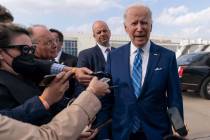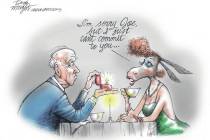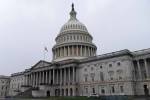EDITORIAL: Polls show we need smaller federal government
Americans are fed up with Washington. Poll after poll shows citizen confidence and trust in federal institutions plunging to historically low levels, a degree of unhappiness that threatens the vitality of our democracy.
Where displeasure with a particular elected official or political party once drove voters to express their frustration at the ballot box, today’s spreading public disgust is leading to cynicism and disengagement. Voters increasingly believe their vote doesn’t matter because no person, no party, no institution is capable of changing course. And if citizens stop paying attention and stop voting, Washington will become even less accountable, less responsive and less effective in addressing national issues.
Consider the following poll results:
— A poll conducted by GfK Public Affairs for The Associated Press in late May found 46 percent of respondents “don’t care very much” which party wins control of Congress and that 62 percent believe the country is headed in the wrong direction. Just 44 percent said they were completely certain they would vote in November, while 12 percent were completely certain they would not vote.
— According to a Gallup poll in June, 30 percent of respondents have a “great deal” or “quite a lot” of confidence in the U.S. Supreme Court, 29 percent have such confidence in the presidency, and just 7 percent have such confidence in Congress.
— September’s annual Gallup poll on public trust in the federal government found just 34 percent of respondents expressed trust in the legislative branch. When Gallup takes its 2014 measurement of public trust two months from now, expect the number to drop.
— According to a June poll for NBC News and The Wall Street Journal, 54 percent of respondents said President Barack Obama “cannot lead and get the job done.”
What’s the solution, if one exists? The public certainly has ideas on how to make Washington work better. Gallup polls show a slim majority of Americans want Congress to work together and compromise. A Rasmussen Reports poll found a slim majority of Americans want President Obama to work with Congress. And the May GfK Public Affairs poll for The Associated Press found almost two-thirds of Americans want their current representative in Congress replaced.
Americans are upset with the partisan gridlock that has resulted from Democratic control of the Senate and Republican control of the House, and they want Congress to work together. But working together means more legislation and more laws for the executive branch to enforce. Last year, Gallup found 60 percent of Americans believe Washington has too much power already, and that 72 percent believe big government is a greater threat to the country than big business or big labor.
American discontent with Washington is about much more than party squabbling. It’s about policy failure. Nothing gets through Congress without carve-outs and exemptions for political friends and penalties for enemies. Nothing comes without unintended consequences and unanticipated costs. Do we really want another one-party boondoggle like the Affordable Care Act or the stimulus, or a new bipartisan debacle like the Patriot Act? Of course not.
Some of the public’s instincts are correct. Whichever party is in power in Washington, we get more federal power, more federal debt and less freedom. Compromise in times of split power typically has resulted in more of the same.
Americans need less federal government. They need less action and less overreach from Washington, and more authority closer to home. Until that happens, Washington shouldn’t expect a bump in the polls.























